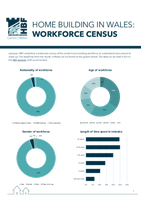Planning policy in Wales is devolved to the Welsh Government. HBF frequently engages with the Welsh Government and Members of the Senedd (MSs) on the key challenges facing the home building industry in Wales.
Current issues of concern to the home building industry in Wales include slow progress in updating Local Development Plans (LDPs), development viability, and broader market conditions such as rising material costs and limited mortgage availability.
This webpage outlines HBF's research relating to the home building industry in Wales, and provides links to resources for our Welsh members.



